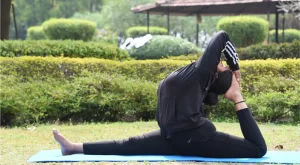Overview: Increasing Popularity of Yoga
Yoga, over the last few decades, has become increasingly popular as a form of exercise and stress management due to increasing awareness of its benefits for physical and mental health.
More people are seeking out places, yoga therapies and trained professionals to guide them in their practice. Hence, the demand for yoga instructors and yoga therapists around the world has significantly grown along with an increase in the number of yoga studios, gyms, and wellness centers.
Post pandemic people have become more heath conscious and the demand for yoga instructors is expected to continue to grow in the future.
So, if you are an individual who has a strong interest in either the practice, or history, and philosophy of yoga, or wants to just explore more about impact of Yoga on mental health or conduct research in this field then you should pursue a professional program in yoga.
It is important to note that a Bachelor's degree in Yoga is not the only way to become a yoga teacher, and that there are other options such as yoga teacher training programs, which are often shorter and more focused on the practical aspects of teaching yoga.
Is a yoga teacher's training better than a bachelor’s degree in yoga?
If you are considering pursuing a career in yoga or simply want to deepen your own practice, a bachelor's degree in yoga may be the perfect path for you. A yoga teacher training program and a bachelor's degree in yoga are both valuable options for those interested in the practice of yoga, but they serve different purposes.
A yoga teacher training program is designed to prepare individuals to lead safe and effective yoga classes. These programs typically range from 200-hour to 500-hour and focus on the practical skills needed to teach yoga, such as proper alignment, sequencing, and adjustments. They also often include a component of yoga philosophy and history. Having a certification from Yoga Alliance is recommended and usually required by employers, and usually a 200-hour teacher training program will suffice.
On the other hand, a bachelor's degree in yoga is a more comprehensive program that provides a deeper understanding of the practice and its history, philosophy, and anatomy. It also gives students the opportunity to learn about other related fields such as health, wellness, and interdisciplinary fields such as physical therapy, occupational therapy, and sports medicine. Yoga therapy is becoming a recognized form of complementary therapy that can be used to support and enhance traditional medical treatments.
Additionally, a degree in yoga can lead to other career opportunities such as working in a wellness center, leading yoga retreats, or even opening your own yoga studio.
While pursuing a 3-year bachelor’s Yoga degree program from a government or private college, such as Himalayan School of Yoga Sciences at Swami Rama Himalayan University, students get to study anatomy, physiology, biochemistry of the mind and body and participate in inter-state & national level competitions.
Internships and placements are also among the key differentiators between a 200 hours yoga training and a bachelor’s in yoga science program. For Example: The bachelor’s degree in yoga from Himalayan School of Yoga Sciences brings in therapeutical aspect to learning as students get to do internship with actual OPDs at in-campus hospital.
In summary, a yoga teacher training program will provide you with the skills and knowledge to teach yoga, while a bachelor's degree in yoga will provide a more comprehensive understanding of the practice and can open a broader range of career opportunities giving you an edge in the job market. It ultimately depends on your goals and what you want to achieve in your practice.
What kind of job and career opportunities are available with a bachelor's degree in Yoga?
Graduates of yoga science programs can expect to find a variety of career opportunities in the field of yoga. Some of the most common career paths include:
-
Yoga instructor: Graduates of yoga science programs can become certified yoga instructors and lead classes in studios, gyms, and other settings. According to various sources, the average salary for a yoga instructor in India can range from INR 15,000 to INR 50,000 per month depending on location, experience and other factors.
-
Yoga therapy: Graduates can also become yoga therapists in health centers, hospitals, medical sector, AYUSH sector or work with individuals or groups privately to help improve their physical and mental health.
-
Wellness center: Graduates can work in a wellness center where they can lead classes, workshops, and retreats. They can also work with clients one-on-one to create personalized yoga programs.
-
Research: Graduates with a strong background in research can also contribute to the advancement of the field of yoga through research studies, clinical trials, and academic publications.
-
Yoga studio owner: Graduates can also open their own yoga studios and create their own class schedules and programs.
-
Yoga teacher in school or college or for corporates: Graduates with a background in education can also work as a yoga teacher in schools or colleges and integrate yoga in the curriculum or can also work in corporate settings and teach yoga to employees as a way to promote health and well-being.
Students with bachelor’s degree in Yoga science can later pursue master’s program or PhD in this field to add more advanced knowledge and skills in the field, and open up more specialized and advanced career opportunities, particularly in research and academia.
For questions related to bachelor’s degree in Yoga science, call our admission counseling team at 0135 2471135 or email us at admissions@srhu.edu.in.

